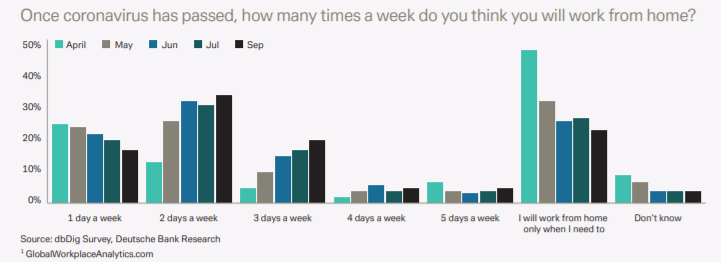In what might become groundbreaking introductory research for shaping future taxation policies, Luke Templeman starts by writing “for years we have needed a tax on remote workers – covid has just made it obvious.“
Published in the most recent edition of Deutsche Bank’s financial journal, this paper raises a controversial and novel approach to income tax.
Based on the prediction that remote work will become more common in the post-pandemic job sector, Templeman pitches that such an arrangement will need to be supplemented by unique employee taxation policies. He highlights a side of remote work that is often overlooked, that being the significant financial savings one might be able to muster by not having to pay for common expenses such as meals at work, commute, work attire, and business lunches. In other words, Templeman’s point of view assumes that remote employees do not participate in the economy as much as non-remote employees do.
While significant evidence regarding this claim is not available at this point, along with the fact that remote employees participate in the economy in other ways, Templeman’s view is still a logical assumption given that the proportion of remote workers will increase considerably and at an unprecedented rate in the years to come.

In Templeman’s own paper, he cites data collected by Deutsche Bank revealing that 33% of employees would like to work from home twice a week and 9% would like to do so thrice once the pandemic is over, as of September 2020. This majority is in stark contrast from the early months of lockdown and social distancing orders when employees felt work from home was only an alternative option for when nothing else was possible.

WFH Tax: How Can be Levied
The paper suggests that 5% of an employee’s daily pay be taxed for every day they worked from home in a month. This estimate only applies to a handful of first world countries, namely, the US, UK, and Germany.
Taking the US as an example, where the average employee’s salary is $55,000 per annum, the daily WFH tax would amount to around $10. This is not an unreasonable amount, according to Templeman, who states that this is about as much as one would spend on work-related expenses on an office workday. By this logic then, a work from the home tax would not affect an individual’s overall income by a lot, considering that people may have to pay WFH tax on 100 days, on an average, in a year.
Exceptions to the Rule
Despite the radical suggestion, it does have certain exceptions in terms of people and periods when such a rule, if implemented, will be suspended.
First and foremost, this only applies to people in jobs where working from home is a viable option. On average, these tend to be corporate sector jobs and might include creative fields.
Thus, essential workers like doctors, nurses, delivery personnel, self-employed individuals, and those in low paying fields will be exempted from such a tax.
Secondly, in periods of national or global emergency like the current pandemic where the government sanctions a lockdown, the tax will not be levied.
However, the idea of a work from home tax is still very unrefined and has certain major loopholes. It fails to take into consideration the fact that the expenses incurred by someone working from home will be very different in nature to the ones incurred by those working in offices.
Employees, in the US especially, have reported an increase in expenses such as electricity, gas, broadband connection, etc. Some employees have also had to pay out of their own pockets for essential work resources such as desks, ergonomic chairs, and in many cases, gadgets. While offices have reimbursement policies for the latter in most first world countries, the same cannot be said for the former. Utility costs aren’t factored into work from home provisions for all. As an example, workers in the UK, where utility reimbursements are provided by many employers, people have lesser exposure to the unique financial stresses of working from home.
All in all, Templeman states that this is by no means an absolute suggestion but is out forward with the aim of sparking debate and discourse, especially among policymakers so that the taxation system can be adjusted and updated according to needs.
Taxes in the Post COVID-19 Era
This suggestion is part of a larger discourse about the dire need for tax reforms in a post-COVID world.
Of late, economies world over have been in a state of crisis and stress due to a sudden spike in expenditure and an equally sudden plunge in income. Governments have had to make a lot of momentary tax exemptions along with distributing stimulus packages to keep the various sectors of the economy afloat. all kinds of businesses have lost customers due to lockdowns and a drop in per capita income due to job losses.
Governments and major financial advising firms are now thinking ahead in order to come up with a game plan to salvage the aftermath of COVID-19.
The International Centre for Tax and Development has put forward three broad suggestions for this.
The first, and the one many others agree upon, is to tax the wealthy more strictly and fill the loopholes or patch up the reforms that have allowed them to ensure the maintenance or even an increase in their wealth during such a time. ICTD states that such an approach will by no means affect the capacity of multimillion-dollar companies to keep investing and innovate to grow.
Along with this, the poorest 50-80% should received protection in the sense that additional tax responsibilities must not fall on them.
Lastly, ICTD suggests that the focus of taxation shift to big tech, which has managed to retain demand and grow even during the pandemic.

